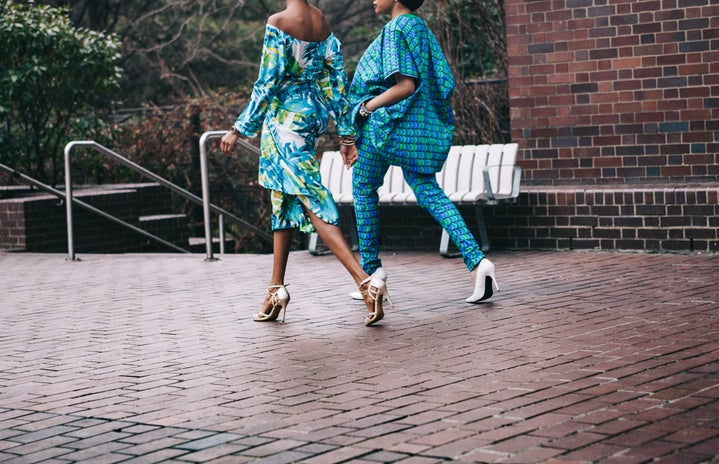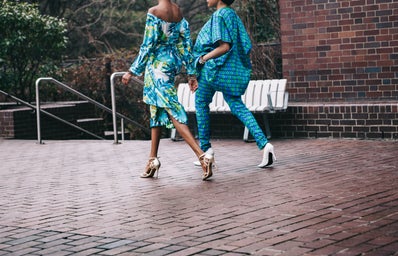In honor of Sexual Assault Awareness month, I interviewed the founder of Catcalls of NYC and the creator of Catcalls of Ithaca, comparing the effects of catcalling in the big city and a small town college campus. The Catcalls of NYC and Ithaca members collect stories from people who have been verbally harassed on the street and write down their stories in chalk where they initially received the harassment. Most people might see catcalling as harmless or not that big of a deal but as you’ll see in each of the interviews, catcalling isn’t simply innocent flirting gone wrong, but instead a form of sexual harassment that allows someone to use their privilege to silence or isolate another person…
Interview with Sophie Sandberg: Creator of Catcalls of NYC
Sophie Sandberg is a Senior at NYU and studies gender and sexuality. She released Catcalls of NYC in March of 2016 to spread awareness about street harassment. Catcalls of NYC has been featured in the New York Times, BBC NEWS, and other various new sites and has a little over 100k followers. The account’s been able to spread to different campuses, states, and countries, one of them even being here at Ithaca College.
Hi, Sophie can you tell me a little bit about what motivated or inspired you to create Catcalls of NYC?
I grew up in New York City and I started getting catcalled when I was 15 years old. It was a very memorable experience because it was my first day of work. I was really excited and nervous, I spent a lot of time that morning figuring out what to wear, but the only thing I really remember now is the catcall that I received on my walk to the subway. I felt really uncomfortable and I didn’t know how to respond. I actually thought I should say thank you at first [laughs] because it seemed like a compliment they were saying things like, “beautiful, gorgeous,” but I still felt really uncomfortable…
That experience stuck with me for a long time and by the time I got into college, I got to thinking about what I could do to respond to catcalling. How I could give myself and others a voice in a moment when you feel so silenced. I took a class called Digital Writing where we were assigned a project to immerse ourselves into [a cause] and document it on social media. I decided to immerse myself in catcalling. I used all these memories and comments that were said to me and my friends and I decided to mark the spots where they were happening and post them on Instagram. I hoped to create a larger picture of what catcalling is from the small comments to the really vulgar comments.
I’m going to play a little devil’s advocate here but for someone who might not support the cause, why call out catcalling? Some might say it’s harmless or not that big of a deal.
A lot of people say that in the comments, especially for [posts] like “Hey beautiful” or “Sexy.” It’s easy for people to say it’s a compliment but what I say about that is the people who send these stories are clearly so impacted by [the catcalling] that they have to share it to talk about it. To say that [catcalling] is a compliment or not a big deal is really just based on people’s experience with [catcalling]. People go through their lives experiencing [catcalling] and it impacts how they feel in public spaces, going to work and school.
Have you ever run into any problems with pedestrians passing by while writing these messages down?
Yeah, definitely! Obviously, I’m writing very vulgar things so people sometimes blame me for that but don’t shoot the messenger [laughs]. Rather than thinking about what they can do to help or continue to raise awareness, they’re just quick to say, “You shouldn’t write that here, this is public space. Children could see that.” I have a lot of thoughts about that but in general, I think that they’re misunderstanding the message behind the account which is to raise awareness about something that’s already going on in these exact spaces. So writing it is just my way of helping people see it.
I’ve also been hit on a few times which is really ironic! I was writing one comment “Hey beautiful,” and a guy said, “Oh wow you are beautiful.” Completely misunderstanding the project. I’ve also had a lot of positive encounters with people that completely understand the project and they say, “thank you for raising awareness, I faced this too and it’s great to see someone doing something about it.”
Why do you think it might be important for young girls and boys to see these messages?
Girls are sending me stories when they’re only 11, 12, or even 13 years old because that’s when it starts. Thinking back to my first experience, it would’ve been good to know that this was a behavior that was happening to a lot of different people because there was the sense that it was just me, it must be a compliment, it must have to do with what I’m wearing. There are all of these questions that pop up into your head when it first happens so I think for young girls and for anyone else who’s going to be harassed at a young age, it’s really important to learn about [catcalling] before it happens.
And for boys, who won’t necessarily face harassment, I think it’s also good for them to learn about this because that’s where we can change the normalization of [catcalling]. So many people argue that, “boys will be boys” and that it’s natural for men and boys to comment on a woman’s appearance in public. And I think even now that’s really normalized. And it’s up to [society] to teach younger boys that [catcalling] is unacceptable. That’s where we can start to change the behavior, hopefully.
I noticed on your social media page that Catcalls of NYC is an advocate for intersectional feminism. I was wondering how else you might use your platform to connect with people of color, queer people, and other intersecting identities.
To me, intersectional feminism, based on Kimberlé Crenshaw’s theorizing, is to really make sure that you center in on people who are facing harassment based on different parts of their identity. Trying to amplify those stories as much as possible. Of course, I can only write the stories I get and there are times I wish I could get more stories that amplify people of color and people in the LGBTQ community. I am a white woman and I’m sensitive to the fact that it’s important to involve people with different perspectives, knowing that my perspective isn’t the only one.
How do you think street art plays a role in protest and activism?
That’s funny that you ask that because I’m actually writing my senior thesis on street art that responds to gender and racial violence. I think street art is a really fantastic way to respond to [catcalling]. It’s really powerful for me especially to go back to the spots where I’d faced this harassment and then kind of switch the roles. Originally I was objectified [by the catcalling] and felt like I couldn’t respond, now I’m the one taking up space on the street making people walk around and see me. And I think it’s really powerful to be able to shift people’s experience in these spaces. So people who wouldn’t ordinarily have to think about this behavior are now reading these comments and they feel the impact of these comments.
Can you tell me about the selection process for the stories you post?
We have thousands of messages right now and we transfer all of the messages into a spreadsheet and write the locations where they happen. I think it’s really important to respect people’s wishes to remain anonymous and I think a lot of people also say, “Oh, all these [girls] just want attention,” and then when it’s anonymous it becomes clear that people have no interest in getting attention. I think that people are still shy even about getting tagged in these posts and they maybe don’t want their friends to see or their family to see because there’s still a sense of shame associated with being harassed, it’s so deeply ingrained in our society that you are somehow at fault for the harassment. And I think some people feel that and that’s why they want to be anonymous.
How can people get involved?
The more people the better! My hope is for the account to grow and becomes a collective because the more [people] write these stories down with chalk, the more people will see it and become drawn to the project, learn about [catcalling], or have support if they’re facing harassment. So if someone wants to get involved, I wouldn’t DM the account because it takes us weeks to sort through our DM’s, but click the email link in our account profile and I’d be happy to meet up with you and get you some chalk to start practicing! The beauty of the project is that anyone can really do it…
Interview with Corinne Cooper: Founder of Catcalls of Ithaca
Corinne Cooper is a Junior at Ithaca College who created Catcalls of Ithaca earlier this year in February 2019. I spoke with Corinne to see how Ithaca College (among other small town colleges) have been impacted by catcalling and verbal harassment.
What motivated you to create the Catcalls of Ithaca account?
I started this whole thing as a project in one of my classes. I started following the Catcalls of NYC account a long time ago. One of my best friends goes to NYU and showed it to me and at first, I didn’t really understand the point. I wasn’t sure how much of an impact the account could have but the more that I followed [Catcalls of NYC] and the more I read about [catcalling], I realized [Catcalls of NYC] gives people a voice when they don’t have a voice. [Catcalls of Ithaca] gives them the chance to take it back.
Why do you think it’s important to have this platform on a college campus or a small town like Ithaca?
Catcalling is more common in a city where you’re walking around and there are tons of people but it still happens here. It’s not just city people who are getting [catcalled] but also people in Ithaca. Everybody does it and it happens to everybody and it’s important that people feel safe on campus. Even though this is a relatively safe campus [catcalling] still happens and you want to make sure that people don’t feel isolated.
Girls come up to me or message me on Instagram [with] their stories and it’s really scary how intense some of them are. Because even though we are a small college campus, it doesn’t matter where you are, just who’s doing it. If you keep ignoring [catcalling] it’s going to make people think it’s okay. And there will be a time when something terrible might happen and it’ll be too late to intervene.
What dangers do you think might arise if catcalling isn’t called out?
If you let [catcalling] keep happening, it’s going to eat away at a lot of people’s self-esteem. If somebody isn’t treating you equally and is treating you as “something” they can just talk at, but not talk to, it’s going to eat away at your self-confidence and things that contribute to who you are. Not only as a straight cisgender woman but also as a transgender woman, a bisexual woman, a gay woman, and all queer women who also get catcalled all the time. And I think if we keep ignoring [catcalling] it could just continue to get more aggressive.
Have you received any negative or positive comments while writing for Catcalls of Ithaca?
Almost every time [laughs]. At least two people say something to me. I’ve gotten laughed at a couple of times and it’s mostly by guys. The guys will just kind of laugh at me or they’ll mock whatever I’m writing. But on the other hand, I do get a lot of girls that come up to me and start conversations with me and tell me their stories. They feel inclined to write when they see it and come talk to me which is awesome. You have to weigh it out; is one guy laughing at you really comparable to three other girls who are really excited about what you’re doing?
How can someone who’s interested in joining Catcalls of IC join and get started?
This is actually a really great question. I’m currently looking for more people to get involved. Right now it’s just me and if any Ithacans want to help me out, that would be awesome! Honestly, if people are ready to put in work to be an activist or to be a voice for people, just start doing it. You don’t even have to be a member of something or a group of something just start being that voice for people who don’t have a voice. And if you want to learn how to start the conversation, come join Catcalls of Ithaca. You can email my school account. I’m a junior and when I graduate, I’d love to see this keep growing and pass it on to somebody when I graduate and have it keep going.
Be sure to follow @catcallsofithaca and @catcallsofnyc! If you’re interested in joining, don’t be shy to email them or message them over Instagram.



